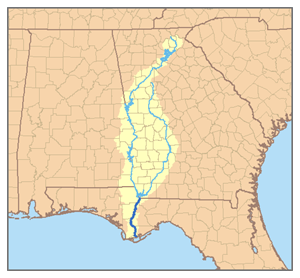Apalachicola River facts for kids
Quick facts for kids Apalachicola River |
|
|---|---|

Map of the Apalachicola River watershed showing the two main tributaries, the Chattahoochee River (left) and the Flint River (right).
|
|
| Country | United States |
| Physical characteristics | |
| Main source | Confluence of Chattahoochee River and Flint River at Chattahoochee, Florida 77 feet (23 m) |
| River mouth | Gulf of Mexico at Apalachicola, Florida |
| Length | 167 miles (269 km) |
| Basin features | |
| Basin size | 19,500 sq mi (50,505 km2) |
The Apalachicola River is a special river in Florida. It is about 112 miles (180 kilometers) long. This river flows into the Gulf of Mexico. It is part of a much larger area called the ACF River Basin. This basin covers about 19,500 square miles (50,500 square kilometers). The river's name comes from the Apalachicola people. They were a Native American group who lived along the river a long time ago.
Contents
River's Journey: Where It Starts and Ends
The Apalachicola River begins in northern Florida. It forms where two other rivers meet. These are the Chattahoochee River and the Flint River. This meeting point is near the town of Chattahoochee, Florida. The river then flows south through Florida. It ends by emptying into the Gulf of Mexico. This happens near the city of Apalachicola, Florida.
Long Reach: The Apalachicola Watershed
A watershed is like a giant bowl. All the rain and water that falls into this bowl eventually flows into one main river. The Apalachicola River's watershed is huge. It is known as the ACF River Basin. This basin includes parts of Georgia, Alabama, and Florida. The farthest parts of this watershed are in northeast Georgia. Water from there travels about 500 miles (800 kilometers) to reach the Gulf of Mexico.
Why the Apalachicola River Is Important
The Apalachicola River is very important for many reasons. It provides a home for lots of plants and animals. It also helps people in the area.
Home for Wildlife
The river and its surrounding lands are rich with nature. Many different kinds of fish live in the river. Birds, like eagles and ospreys, hunt along its banks. Alligators and turtles can also be found there. The river's delta, where it meets the Gulf, is a special place. It has unique plants and animals that depend on the mix of fresh and saltwater.
Natural Resources and Economy
The river has been used for transportation for a long time. Boats carry goods along its waters. Fishing is also a big activity here. The river supports a large oyster industry in Apalachicola Bay. This provides jobs for many people. The river also helps keep the local environment healthy. It brings fresh water and nutrients to the bay. This helps the seafood grow.
Images for kids
-
View of Apalachicola River at Torreya State Park
-
View of the Apalachicola River near Fort Gadsden, Florida
See also
 In Spanish: Río Apalachicola para niños
In Spanish: Río Apalachicola para niños


